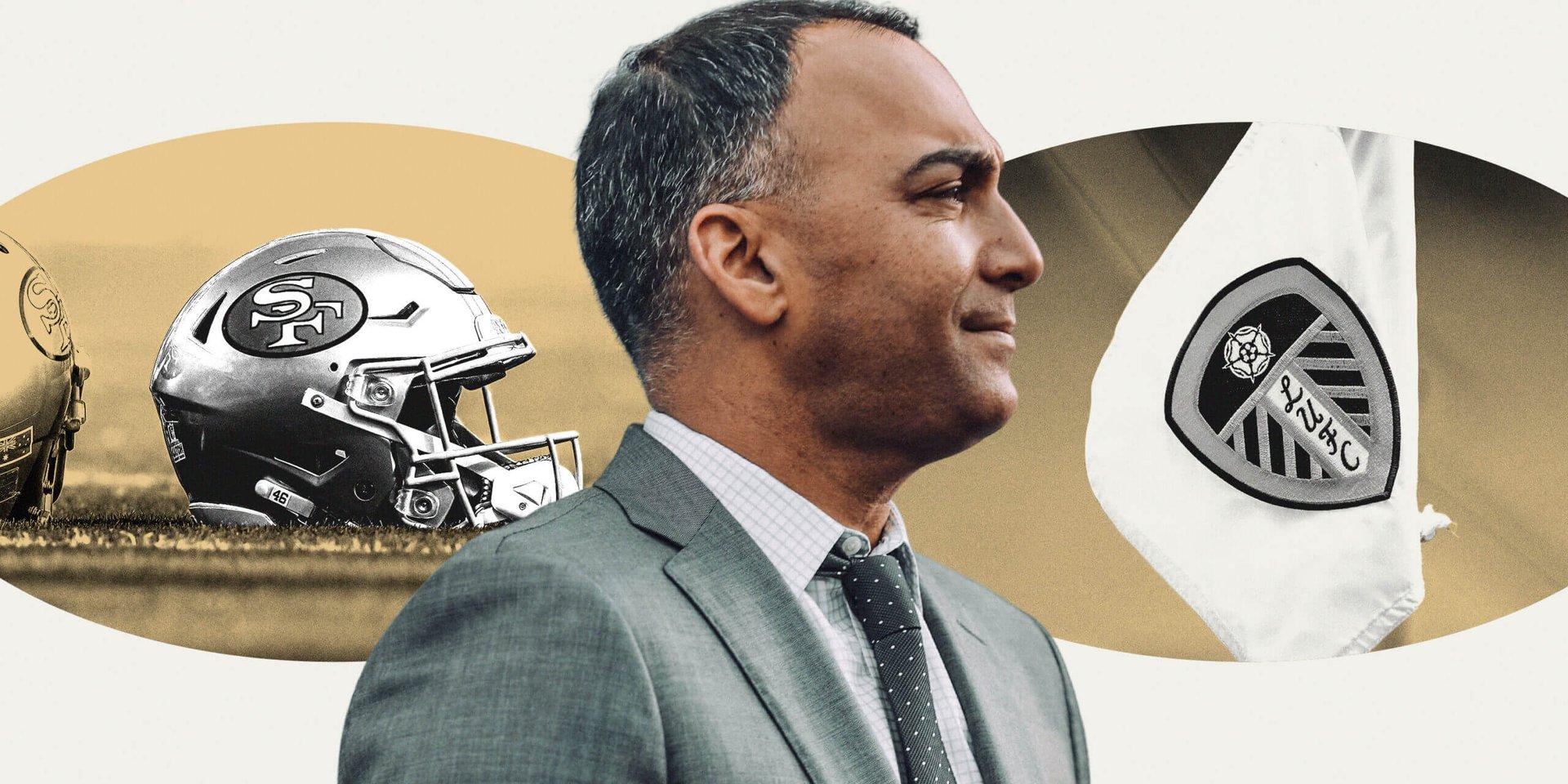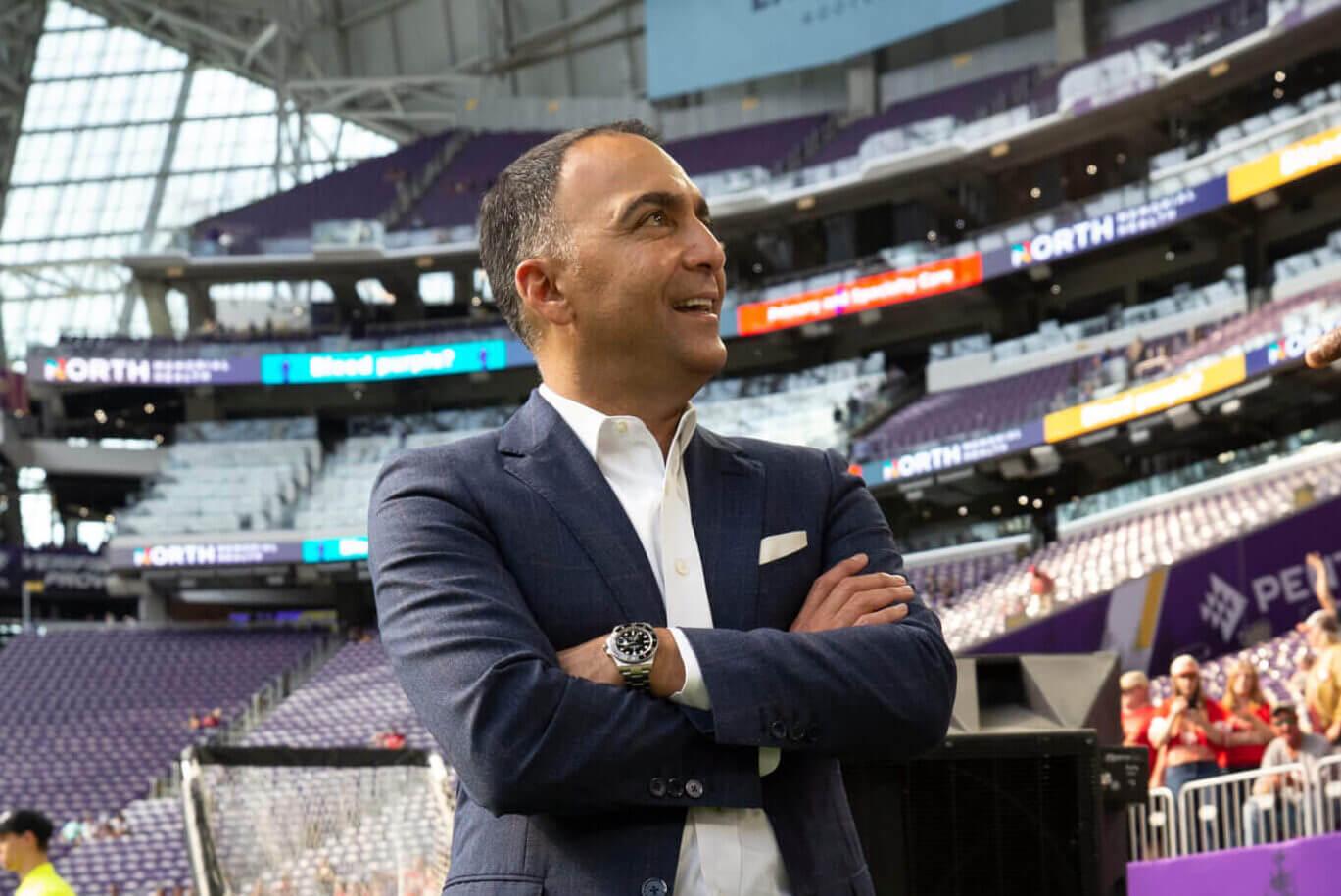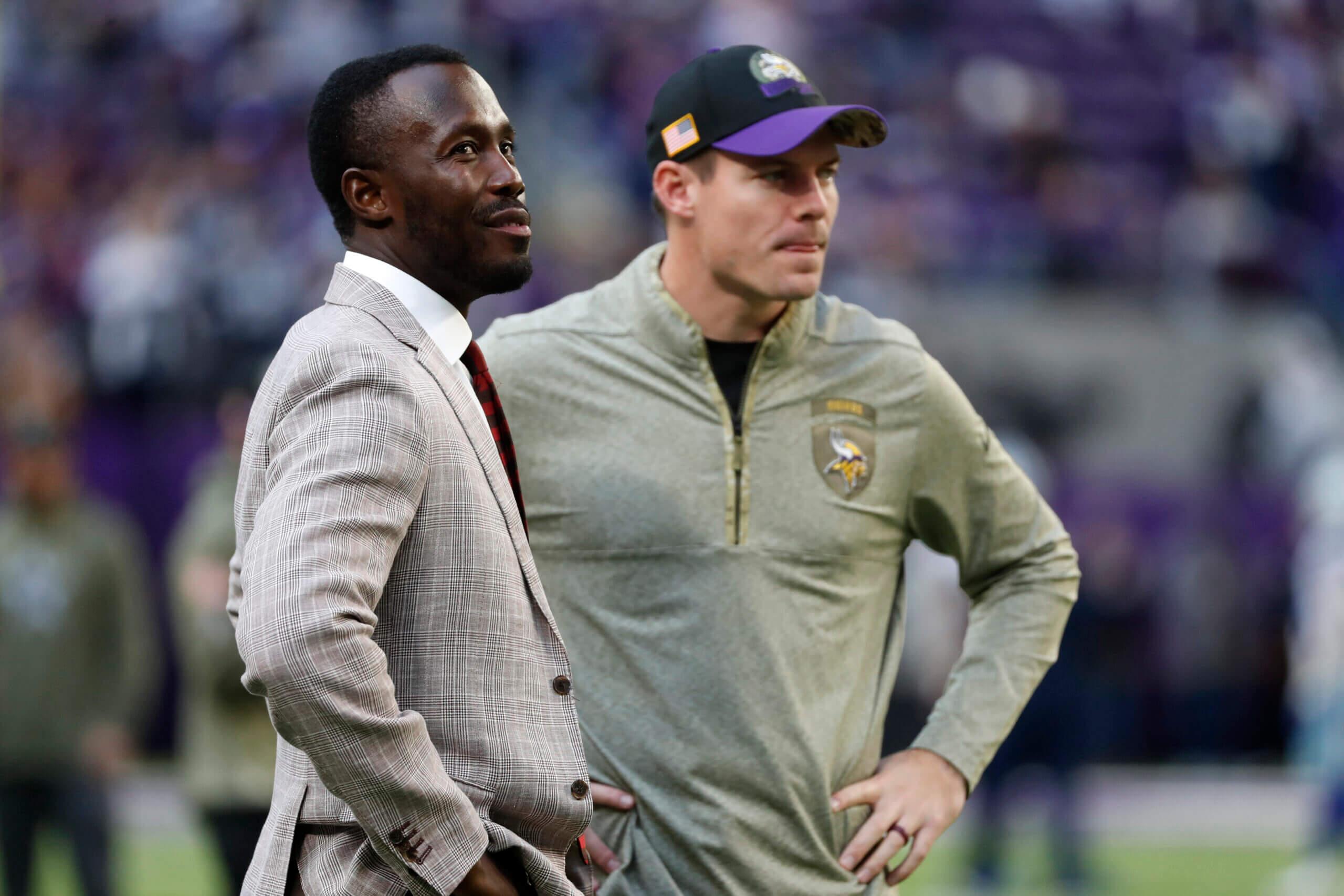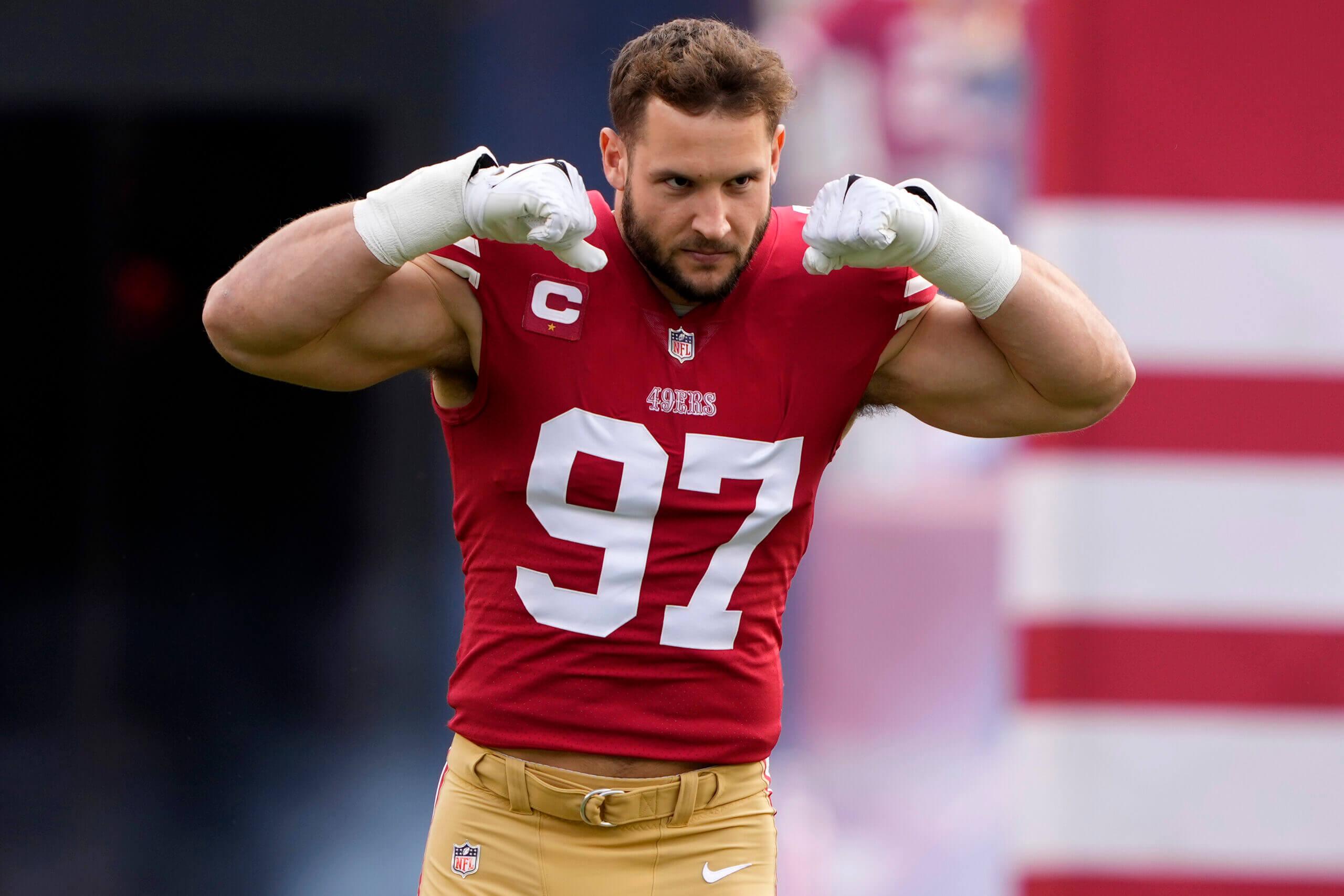
Paraag Marathe, future Leeds chairman: NFL numbers man who rose above critics to top of 49ers
11
At the height of attempts to nail down a takeover of Leeds United, very few of the main protagonists had the luxury of sleep.
Time was short in any case, this summer already ticking on after Leeds’ relegation from the Premier League, but the logistics of talks were complicated too. Andrea Radrizzani, a reluctant and aloof selling party, was in Italy with at least one eye on his own intended purchase of Sampdoria, likewise newly-relegated from Serie A. In San Francisco, where 49ers Enterprises was pushing for full ownership of Leeds, the clocks were nine hours behind Italian time. At both ends people stayed up through the night, trying to minimise delays. WhatsApp messages bounced back and forth in the early hours of the morning.
In the middle of everything was Paraag Marathe, the man with the job of being all things to all men.
Marathe was at the coal face in dealing with Radrizzani, trying to convince the Italian to part with Leeds for terms which 49ers Enterprises could accept. He was also at the coal face at the opposite end of the table, managing his group of investors, keeping them sweet, placating those who might be getting cold feet as the purchase dragged on. One major Zoom call instigated by Marathe with different investment parties took place as late as the final Thursday in May, four days before the last round of Premier League matches on May 28, with Leeds about to go down. Even then, discussions were fluid about how the make-up of the fund might change, who was in and who was out. The original plan had been to acquire a top-flight team.
Shaking hands with Radrizzani was only part of the battle. Once a deal fell into place, as it did just over a week into June, it was incumbent on Marathe as the lead figure in 49ers Enterprises to make sure the funds to complete the buy-out were there, irrespective of the fact relegation had lowered Leeds’ value substantially and altered the commitment of certain 49ers Enterprises partners. At least two Los Angeles investors, both of whom were ready to get involved with a Premier League club, pulled out but, crucially, the plan to acquire control of Leeds held firm. 49ers Enterprises would fulfil its aim of completing a scheduled takeover, albeit in fraught circumstances at the death.

Marathe will become Leeds United chairman (Photo: Michael Zagaris/San Francisco 49ers/Getty Images)
Marathe had been in the thick of it from the start, right back to 2018 when he brought 49ers Enterprises to the boardroom table at Elland Road, initially for a small shareholding of just over 10 per cent. Leeds were recommended to him as an investment opportunity by one-time Chelsea director Mike Forde, chairman of New York consultancy firm Sportsology.
Marathe is in the thick of it to an even greater degree now. He will become the new face at the top of the club and the new chairman when the takeover receives EFL approval and is officially done. This was the position a 49ers Enterprises takeover was always going to earn him. Convincing Radrizzani to exit had been challenging, a hard conversation to win, but Marathe emerged victorious.
“This wasn’t one they were going to let go,” said a source with links to 49ers Enterprises’ investment group who was granted anonymity to protect business relationships. “Paraag’s whole attitude was, ‘Let’s get this done — let’s make it happen’, like they’d come too far to lose out now. It needed that energy to push it over the line. But they’ll tell you that about him — he sticks to his guns.”
Marathe has had a hand in English football for fully five years now — two and a half of those as vice-chairman of Leeds — but the outright responsibility of managing the club will be a hike in pressure and, in present circumstances, an intense test of suitability.
Major changes at Elland Road were unavoidable this summer anyway but relegation has heightened the scale of that change, dumping the club back into a second tier where 49ers Enterprises does not want to wallow for long. On the Monday after the season finished, Leeds were in need of a new owner, a new head coach, a new sporting director and a new squad. The entire framework was broken.
But Marathe’s full entry into the sport, far away from the world of NFL he knows so much more about, does not mean he is unprepared for it. On the contrary, his experience of working for more than 20 years for the San Francisco 49ers had exposed him to politics and ideological conflicts which exist, or certainly used to exist, at the top of European football too. A close friend of current 49ers chief executive Jed York, whose family owns the NFL team, Marathe lived the life of the outsider for a while in American football — a numbers man trying to integrate himself in a sport which was sceptical of him and his input.
Marathe was part of, and saw first-hand, the shift in the NFL from old-school resistance to data-driven strategies to an acceptance of models which franchises including the 49ers now embrace and invest in constantly. He was a member of the new guard, regarded as a ‘Moneyball’ disciple at a time when few people in the NFL thought the concept applied to their sport or was worth giving the time of day. He did not try to make himself publicly visible but, over time, his influence and seniority within the 49ers grew. So too did the tendency to blame him for the franchise’s problems.
Among 49ers fans, he was seen in some quarters as a malign presence. Head coaches and general managers came and went, the landscape would change and certain periods, like 2014 to 2018, were incredibly fallow for the 49ers. But, without fail, Marathe remained — someone the team’s owners did not want to either sacrifice or hold culpable. It was often asked if his friendship with Jed York was making him untouchable or diverting blame for poor performance elsewhere.
Around the turn of this century, when Marathe first joined the 49ers, he was an unusual entity in an NFL set-up: a business graduate in his early twenties with a specific remit for influencing player trades and draft picks. NFL teams and their general managers were not used to having people like him so close to that side of the business. These days, the acceptance of staff with academic backgrounds is far less begrudging and widely accepted. Kwesi Adofo-Mensah, general manager of the Minnesota Vikings, studied at Princeton and Stanford and worked on Wall Street before changing career course. Adofo-Mensah, as it happened, first got himself into the NFL when Marathe hired him to join the 49ers’ research and development department.

Adofo-Mensah, left, with Minnesota head coach Kevin O’Connell (Photo: AP Photo/Bruce Kluckhohn)
Marathe was part of a culture war in the NFL, one which English and European football understands well.
On one hand were traditionalists such as Bill Walsh, the revered head coach who won the 49ers three Super Bowls in eight years in the 1980s and set them up to win another one the season after he retired in 1989. Walsh was all about intuition and the naked eye, trusting his ability to spot a player or a good signing on the strength of nous built up over years in the game. Among his more remarkable finds was Jerry Rice, a wide receiver Walsh identified while casually watching a lower-league college game on TV. That was how it had always been done and Walsh’s track record said his methods worked.
On the other hand you had Marathe and people like him. Marathe was invited to join the 49ers because the franchise wanted him to analyse their potential picks in the NFL’s annual college draft differently. Change was afoot because control of the 49ers was passing from Eddie DeBartolo Jr to his brother-in-law John York (the father of Jed). Marathe arrived from consultancy firm Bain & Co and his task was to pick through data, dig into the numbers and see if statistics could give the 49ers an edge when it came to nailing the draft. It is a prime area in which any team could find a competitive edge.
Marathe, professionally, had no background in the NFL. He grew up in the Californian city of San Jose, a 45-minute drive south of San Francisco, with parents who ran pizza restaurants. As a kid, he would work in them. It was one of the ways he sells himself to people — that, unlike many people at a high level in professional sport, he is not the scion of a rich or powerful family. He came from fairly humble beginnings and he has held prominent positions in the NFL which taught him to understand and empathise with head coaches and the like. On top of that, it gave him an education in dealing with players and agents, a key aspect of football ownership.
He supported the 49ers but academically, he was chasing business qualifications. His mother and father had emigrated to the U.S. from India and Marathe reflected in an interview with the Mercury News, a morning newspaper in San Jose, on how Indian-American culture loosely dictated that “everyone’s got to be a doctor or engineer, or maybe a lawyer. Working in sports, my whole family, the ones who are in India and everywhere else — they just thought it was a hobby.”
Professional sport, however, would reel him in more and more. Marathe fronted 49ers Enterprises’ first investment in Leeds in 2018 and, until 2022, he was chairman of the USA cricket board, a position which explained the cricket bat people would see in his office.
As The Athletic has previously detailed, the 49ers turning to Bain & Co for a data mind to help with player recruitment was the cause of friction. Within the franchise were people who resisted Marathe’s way of thinking and did not want what they perceived as interference in their processes. But Marathe stood by his work and persisted with the belief that statistics could make a difference. In time, he was entrusted with being the 49ers’ main contract negotiator and tasked with managing the NFL’s salary cap restrictions, developing skills which, to a degree, should be transferable into English football.
His appointment as chairman of Leeds is not expected to end his responsibility for agreeing deals with 49ers players, most likely a reason why Marathe will continue to spend a large amount of time in the U.S. while staff on the ground at Elland Road look after day-to-day operations in England. One of the key jobs for the 49ers in the months ahead is a contract extension for defensive end Nick Bosa, the current NFL defensive player of the year.

Re-signing Bosa will remain on Marathe’s mind (Photo: Thearon W. Henderson/Getty Images)
In periods where success was lacking for the 49ers, Marathe’s reputation suffered. The scenario was not so dissimilar to that of Victor Orta, Leeds much-criticised former director of football who left the club in the final months of last season as relegation loomed. Shortcomings at the 49ers were often laid at Marathe’s door. There was not always a clear understanding or much appreciation of what he did, and negative perceptions of him manifested themselves in the content of conversations between fans and radio phone-in hosts. In blunt terms, what was someone like him doing in the front office? Was Marathe a help or a hindrance?
He had overseen the building of the 49ers’ new Levi’s Stadium in Santa Clara, just a few miles from hometown San Jose — a project that should proffer useful knowledge should Leeds move back towards the Premier League and redevelop Elland Road — at a cost of around £1billion ($1.25bn at current exchange rates). While the venue did not please everyone, it was a moneymaker for the franchise — besides 49ers games it has been the venue for one Super Bowl and will host another in 2026 — and Marathe drew credit for delivering a new arena in California, where public money was largely unavailable to tap into. One 49ers’ official, speaking on condition of anonymity, described him as “collaborative” — someone who “tries to find the best people in their area of expertise”. He is regarded as diplomatic but persuasive, not least by those who saw him hold the takeover of Leeds together.
Times have changed in the NFL and, recently, for the 49ers. The franchise has not won a Super Bowl this century but they were beaten in it in 2013 and 2020 and have made the NFC Championship game (effectively the semi-finals) in three of the last four years. In 2017, as part of a deliberately patient hiring process, Jed York and Marathe brought together the combination of head coach Kyle Shanahan and general manager John Lynch on very long contracts, a successful partnership with good compatibility. The 49ers put great weight on compatibility after seeing a previous pairing of Jim Harbaugh and Trent Baalke erode because of poor communication and mistrust having made the 2013 Super Bowl.

GO DEEPER
Orta at Leeds: From Bielsa brilliance to Gracia - and total conviction to the bitter end
That it took an extended period to settle on Shanahan and Lynch is fairly instructive.
In choosing a new head coach at Leeds, after the club got through three of them last season, Marathe and those around him have been similarly patient, refusing to rush or give into sentiment urging them to act more quickly. Emphasis has been placed on finding someone they connected with and whose attitude matched their own. The process has been deliberate and is believed to have had input from Sportsology early on. From the outset, Marathe has stuck to his timeline, even though the start of pre-season training in early July is coming at him rapidly. It is how the regime on his watch is likely to look from here.
The offensive system favoured by Shanahan is in vogue in the NFL. Three general managers in the league at present worked for the 49ers previously. Perceptions of the 49ers’ management have improved markedly and so, as a result, have views on Marathe’s. Replacing him as team president in 2016 was seen externally as a demotion but that led him to take on new responsibility for 49ers Enterprises, the investment vehicle which has led this purchase of Leeds. From the beginning of 2021 onwards, the fund was dead-set on turning a minority stake in the club into 100 per cent ownership.
Data, inevitably, is bigger than ever in the NFL, just as it is everywhere in football. A takeover with Marathe involved is unlikely to see Leeds backing off on that front. The principle, as he saw it, was that scouting and data should overlap and help each other — and it was applied in April, when the 49ers chose defensive end Robert Beal Jr as one of their nine 2023 draft picks.
The team wanted a defensive lineman who broke the line of scrimmage quickly, and their research and development department developed a metric which analysed how quickly a player covered the first two yards upfield. Beal Jr scored extremely highly, despite not being a particularly productive college player overall, and was targeted to play a specific (and different) role.
He earned his chance via this metric, which the department jokingly referred to as ‘GTFO’. Why the name? The 49ers’ defensive line coach, Kris Kocurek, had a very distinctive way during practice of reminding players to burst over the line of scrimmage rapidly: “Get the f*** off!”
There is no chance that Marathe, when he becomes chairman of Leeds, can hover in the background out of view, but he is a different personality to Radrizzani: more corporate, more polished and less inclined to say things he shouldn’t. Radrizzani was active on Twitter, sometimes to his and Leeds’ detriment. Marathe does not appear to run a Twitter account. He has a private Instagram page with fewer than 1,000 followers and, in interviews about Leeds to this point, he has been consistently guarded in talking fine details.
Diplomatic or otherwise, he was successful in standing firm over a price for Leeds once 49ers Enterprises decided that, now without Premier League status, the club were worth no more than £170million ($210m). He was equally successful in maintaining a solid investment group amid the uncertainty of a relegation fight. The characters in it, from Australian businessman Peter Lowy to U.S. entrepreneur Rudy Cline-Thomas, are by no means cut from the same cloth, but Marathe is regarded as being talented at “speaking whichever (business) language he has to speak”. Interest in the purchase did not crumble.
“You have to remember that, in the original deal, there was no provision for what would happen if Leeds got relegated,” said the investment source quoted in the first part of this article. “Everyone knew the deal if they stayed in the Premier League but when that didn’t happen, there was no agreement at all. So to get it in line in a couple of weeks — it says a lot.”
Marathe, said another party with knowledge of 49ers Enterprises’ takeover, is “very driven and always on, extremely competitive”. Their perception is that, for Marathe personally, the Leeds deal is not just a matter of finance — the competitive edge of football has real appeal too.

GO DEEPER
Leeds United: What happened?
Though people within Elland Road were careful to paint the relationship between Radrizzani and 49ers Enterprises as smooth and agreeable in public, it became thorny latterly — most of all when it emerged Leeds’ stadium had been offered as collateral in a loan which Radrizzani and a separate group of investors were considering using to buy Italian club Sampdoria. That revelation has been described as a “tipping point” to The Athletic; the moment which left Radrizzani with no way back and hardened 49ers Enterprises’ determination to buy him out. The prospect of any future partnership with him was gone.
For so long, a majority stake gave Radrizzani the greater share of control in the boardroom and although Marathe and his group respected his authority, they would push back on certain things — like Radrizzani’s suggestion in January that record signing Georginio Rutter arrive on loan from German side Hoffenheim rather than permanently. They were strongly opposed to Jack Harrison leaving for relegation-picture rivals Leicester City in the same transfer window, a mooted sale Radrizzani favoured. And when it came to finalising the takeover deal, there was no relenting on the insistence that Radrizzani should leave the club completely.
But, until the takeover finally goes through, 49ers Enterprises has not had the benefit of full ownership or the freedom to do as it pleases without interference. Marathe remained in the U.S. immediately after terms were agreed in principle early this month but flew to England a week or so later to take part in final interviews with candidates for the role of Leeds’ head coach. Decisions like that will be his alone to sign off on.
Leeds will soon be in Marathe’s hands, with a core group of investors behind him, and one of the things supporters of the club might look for is some reflection from him on what went wrong over the past two years; what part 49ers Enterprises played in that or what responsibility it bears, what the group has learned and how its style of ownership will contrast to Radrizzani’s. What will the brave new world look like?
If Marathe was short on sleep before then the weeks after the takeover is finalised will not offer much respite with so much to be done. Compared to the NFL, this is a totally different sport with a totally different culture and vibes — but with many of the same pitfalls and politics.
In that respect, Marathe might feel he already has the education he needs.
